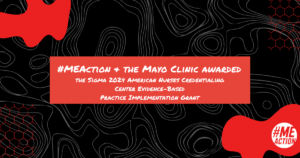The Solve ME/CFS Initiative (SMCI) recently highlighted a paper published online on October 17, 2016 in Nature Genetics, one of the most rigorous publications in the field of genetics with tantalizing findings. The paper, titled “Elevated basal serum tryptase identifies a multisystem disorder associated with increased TPSAB1 copy number,” had two key features that could potentially be relevant to ME/CFS:
- It’s based on work published in 2014 by the same group at the NIH (also reported by another group) in which elevated levels of a secreted protein called tryptase were found to strongly correlate with medically unexplained symptoms, including irritable bowel syndrome, cutaneous complaints, connective tissue abnormalities, body pain/headache, sleep disorders, and dysautonomia (abnormality of function of the involuntary nervous system). While this paper, as well as the earlier work , did not look specifically at ME/CFS features like post-exertional malaise or select patients based on any ME/CFS criteria, this symptom complex is seen in ME/CFS. As such, this protein (that can be readily measured in blood serum) could be relevant to ME/CFS.
- The paper uncovered a new hereditary mechanism that explains the increase in the tryptase levels associated with the compatibility of the above-described symptoms. This mechanism is genetic in nature and passed down through generations — but not in a gender-related manner. Importantly, this paper also showed that individuals harboring three copies of tryptase had higher basal serum levels of tryptase and were more symptomatic than those with two copies, suggesting what is referred to as gene-dose effect, meaning symptom severity is directly proportional to the amount of genes present. This is also a relevant observation in the event that this factor is a player in ME/CFS, given the broad spectrum of symptom severity in ME/CFS.
 Of note, tryptase is an enzyme that is secreted (alongside histamine) from mast cells, which are key immune cells essential in allergic response that are found throughout the body, including in skin cells, lungs, intestines, air passages, and bone marrow. Cases of dysregulated and chronic mast cell activation (known as mastocytosis) can be slow progressing or aggressive, and mastocytosis can cause organ system failure. Leukemia has also been reported in some cases. This study dubbed the symptom complex ‘hereditary alpha-tryptasemia syndrome’. Whether ME/CFS is associated with tryptasemia remains to be seen, but it’s worthy of a serious investigation. The Solve ME/CFS Initiative gives this paper a thumbs up.
Of note, tryptase is an enzyme that is secreted (alongside histamine) from mast cells, which are key immune cells essential in allergic response that are found throughout the body, including in skin cells, lungs, intestines, air passages, and bone marrow. Cases of dysregulated and chronic mast cell activation (known as mastocytosis) can be slow progressing or aggressive, and mastocytosis can cause organ system failure. Leukemia has also been reported in some cases. This study dubbed the symptom complex ‘hereditary alpha-tryptasemia syndrome’. Whether ME/CFS is associated with tryptasemia remains to be seen, but it’s worthy of a serious investigation. The Solve ME/CFS Initiative gives this paper a thumbs up.
http://solvecfs.org/recent-tryptase-study-yields-potential-mecfs-insight/
Save
Save
Save
Save






1 thought on “Recent Tryptase Study Yields Potential ME/CFS Insight”
My husbands Tryptase level is 58 !!
His doctor is retesting. My husband does have Psoriasis on his legs which is now controlled with clobetasol topical etc and itch has stopped. But they dont know why his tryptase level is way up. No other symptoms. He is 59 years old. also high htc & hemoglobin & extra mast cells. Already did bone marrow biopsy that shows no PV .His hct is 58, hemoglobin 21.5.
He smokes .
He feels good and is energetic.
Any ideas & is 58 a super high level? we are worried..
NC.
Comments are closed.